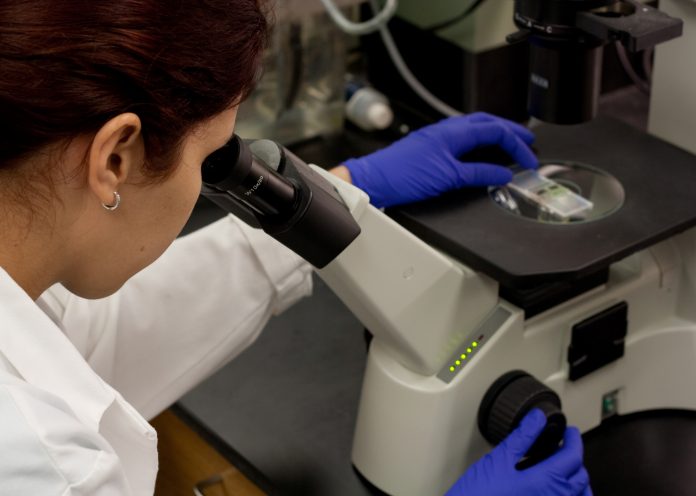Imperial College London are working on clinical trials of a kisspeptin drug that could treat polycystic ovary syndrome (PCOS) and other reproductive health problems
One in ten women in the UK are diagnosed with PCOS. However, more than half of these women do not have any symptoms.
What are some PCOS symptoms?
- Irregular periods or no periods at all;
- Difficulty getting pregnant as a result of irregular ovulation or failure to ovulate
excessive hair growth (hirsutism) – usually on the face, chest, back or buttocks; - Weight gain;
- Thinning hair and hair loss from the head;
- Oily skin or acne.
Right now, there are no cohesive cures available. Instead the condition is managed via medicine to treat infertility and doctor-recommended dietary changes.
Why is kisspeptin important for reproductive health?
Kisspeptin is a naturally occurring hormone that controls the levels of other reproductive hormones in the body and plays an important role in fertility, reproductive health and the regulation of normal menstrual cycles.
Previous studies have shown that kisspeptin can be used to safely stimulate reproductive hormones in women undergoing IVF treatment without causing OHSS. The research team at Imperial College London wanted to see whether MVT-602 could target the kisspeptin pathway and produce a longer hormonal release than the naturally occurring form of kisspeptin – which is important for using kisspeptin to treat reproductive disorders.
24 women aged 18-32 participated
Researchers carried out a trial at Hammersmith Hospital, part of Imperial College Healthcare NHS Trust, on 24 women aged 18-35 from 2017-2019. Twelve of the women were healthy volunteers and 12 of the women had either PCOS or HA. All of the women were given MVT-602. In addition, all of the healthy volunteers were given an injection of the naturally occurring kisspeptin (KP54) and saline placebo for comparison.
The researchers then compared the women’s reproductive hormone levels after receiving MVT-602 to naturally occurring kisspeptin (KP54). They also compared the reproductive hormone levels after MVT-602 between healthy women, women with HA and those with PCOS.
The results showed significant reproductive improvement
They found that all of the women given MVT-602 had a longer duration of raised reproductive hormones, specifically luteinising hormone (LH) and follicle stimulating hormone (FSH) levels, than when they received native kisspeptin (KP54). LH levels peaked at 21-22 hours after MVT-602 and remained elevated for 48 hours.
This is in comparison to natural kisspeptin (KP54) whereby LH levels peaked at 4.7 hours after administration and remained elevated for 12-14 hours. Therefore, the duration of LH rise was extended by approximately four times using MVT-602. LH increases following MVT-602 were similar in PCOS and healthy women, but rose more quickly in women in HA.
Theoretically, this could be because women with HA have more kisspeptin receptors in the hypothalamus of the brain where kisspeptin acts as a result of their condition.
‘Longer duration of hormonal stimulation’
Dr Ali Abbara, NIHR Clinician Scientist at Imperial College London and Consultant in Endocrinology at Imperial College Healthcare NHS Trust, who co-led the work, commented:
“This is the first study to show that a single dose of MVT-602 can induce a longer duration of hormonal stimulation in women than naturally occurring kisspeptin. Therefore, it reveals exciting potential to treat a range of reproductive health conditions using MVT-602 and offer women improved treatment options.
“However, further research is needed to fully characterise its effects in specific disorders that affect reproductive health.”
‘These conditions can cause a lot of distress’
Professor Waljit Dhillo, lead author, NIHR Research Professor in Endocrinology and Metabolism at Imperial College London and Consultant in Endocrinology at Imperial College Healthcare NHS Trust, said:
“Reproductive health issues are common for women around the world. Infertility as a result of these conditions can cause a lot of distress. Although we have made great strides in developing treatments for infertility and other reproductive disorders there is a need to find more effective treatments.
“Our previous work showed that kisspeptin can be used to stimulate ovulation in women undergoing in vitro fertilisation (IVF) treatment, but there are some limitations on using the naturally occurring kisspeptin hormone as its effectiveness wares off after a few hours. This study suggests that MVT-602 can stimulate kisspeptin over a longer period of time with no side effects, which means we could potentially use it to treat a wider range of reproductive disorders.
“This is an early stage study and more research needs to be carried out to fully determine the effects of MVT-602 on more patients.”
More information about participating in future research studies using kisspeptin can be reached by contacting kisspeptin@imperial.ac.uk.











